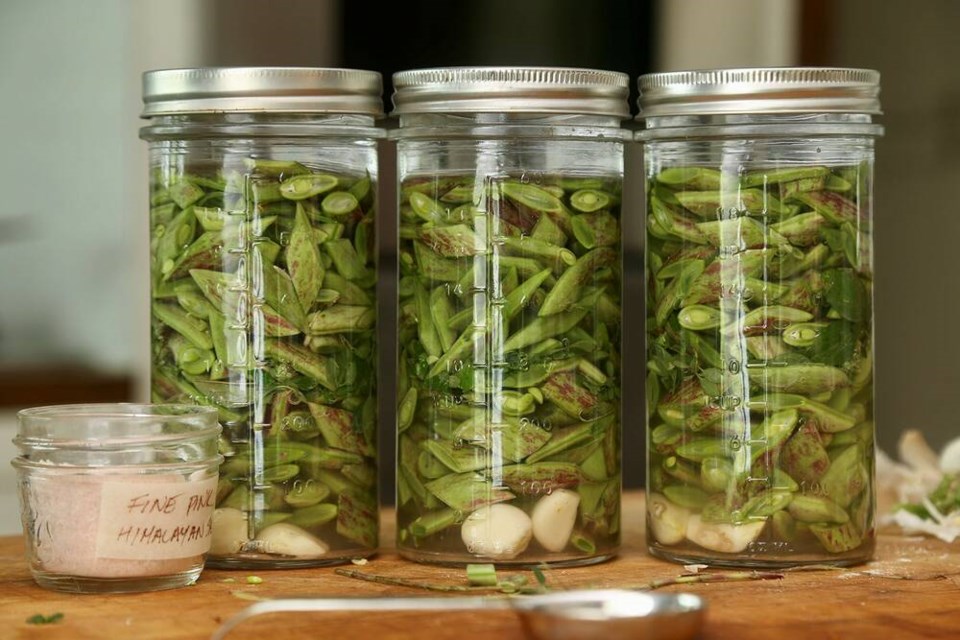During these last gasps of summer, as the kitchen overflows with food-garden perishables, I am leaning on lacto-fermentation as a means of boosting both shelf life and on-board beneficial biology.
Lacto-fermentation is an ancient form of preserving food that utilizes sea salt and untreated water to kickstart an anaerobic biological process between ambient yeast and beneficial biology originating in living soil. Over the course of several weeks or months, the nutritional pedigree of organic food can be elevated many-fold, to create vibrant and delicious, gut-and-brain-healthy food that can last for several months in a cold or cool, clean environment.
A recent flush of stunning flat Greek string beans gifted to me by my friend Maria Bird, inspired the ferment. Maria dropped by early in May, with her sweet young children, two skookum potted tomato seedlings, and exactly 40 beans packed in a large pinch of dried Greek oregano. Yiayias, she explained (the Greek equivalent of Italian Nonnas), store seed beans in antimicrobial oregano to deter pests and preserve vitality.
Yiayia was right. Every seed germinated, and after sharing two seedlings with my chef friend Robert Bartley, I planted the remaining 38 plants beneath iron obelisks in a raised bed.
To describe the plants as robust is an understatement. Dark green leaves emerged thick and leathery, naturally resistant to insect predation, sunburn and heat shock. Unusually tender and succulent beans hung in generous clumps, tasting sweeter than any variety I’ve ever grown.
As the plants grew, slender tendrils wrapped themselves fast and intuitively around the iron, requiring no intervention whatsoever. Not a single leaf curled or turned brown. Even now, after abrupt cold and rain, the resilient plants are gifting a second flush of gorgeous bright green beans.
Maria shared that the seed beans, like the tomato seeds, have been saved for generations by her Greek family – most recently by her uncle who brought them to Canada 65 years ago, and before that by her yiayia who lived to be 102. The family returns annually to the now-abandoned village of Stournára from whence they came, for a reunion. Stournára is a settlement in the Evritania district of Central Greece, some 820 metres above the Aegean Sea. Less than a handful of people live there now, in relative isolation.
The Blue Zone-esque landscape, while ancient and beautiful, appears formidable, and explains the robust genetics of the beans. The tomatoes too, grew to herculean size, bulk and nutrient-density, but that is a story for another day.
I am naming the bean variety Yiayia, and the tomatoes Maria. We will continue their namesake’s traditions of saving seeds, and revelling in their gifts of nourishment and building community. This week, in homage to Stournára and to Maria, I rested bias-cut Yiayias in jars, on beds of fresh Greek oregano and peeled Greek garlic cloves, then covered them with sea-salted spring water and glass weights.
Through the magic of lacto-fermentation, the biology from our living soil together with the ancient biology of the beans will populate the brine, and after a few weeks of regularly burping the sealed jars as beneficial bacteria feast on simple sugars and produce carbon dioxide, I will transfer the fermented vegetables in their organic acids bath, to the fridge where they should keep well and help keep us well, for many, many months.
I imagine that Maria’s yiayia would have stored her beans in the cool dark of her kitchen, behind thick whitewashed walls, shaded perhaps, by an ancient olive tree.
I am grateful to Maria’s family for saving these remarkable seeds, and to Maria for sharing her Greek agrarian traditions with me.
Laura Marie Neubert is a West Vancouver-based urban permaculture designer. Follow her on Instagram @upfrontandbeautiful, learn more about permaculture by visiting her Upfront & Beautiful website or email your questions to her here.
For a taste of permaculture, watch the video below:



